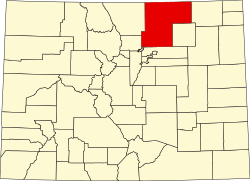This article needs additional citations for verification .(February 2011) |
Keota | |
|---|---|
 Remains of the Keota church, 2010 | |
| Coordinates: 40°42′10″N104°04′31″W / 40.70278°N 104.07528°W | |
| Country | USA |
| State | Colorado |
| County | Weld |
| Established | 1880 |
Keota is a mostly abandoned town located on the prairie in the Pawnee National Grasslands in Weld County in the U.S. state of Colorado.
Contents
Keota's elevation is 4,964 ft (1,513 m). [1] Keota is located approximately 50 miles east of Fort Collins on County Road 103. Pawnee Buttes, a pair of prominent sandstone escarpments, which are significant nesting areas for hawks, falcons, and eagles, is located nearby.


